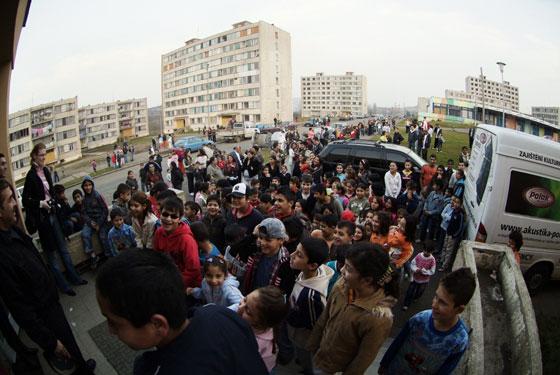EU Fundamental Rights Agency: Poverty threatens 77 % of Roma in the Czech Republic

Despite goals set by the European Union, the living conditions of Romani people in Europe have not improved since 2016 and remain deplorable. Romani people have practically no prospects in employment or school.
The EU Fundamental Rights Agency (FRA) has announced its findings in a new report. The document, released today, is based on 8,500 interviews conducted with Romani people in 10 EU Member States: Croatia, the Czech Republic, Greece, Hungary, Italy, North Macedonia, Portugal, Romania, Serbia and Spain, and also includes data from Bulgaria and Slovakia.
The report recalls that the EU has established goals for facilitating the integration of Romani people into society, but progress is insufficient and too slow. According to FRA, poverty still threatens 80 % of Romani people in the EU, while the average for the entire EU population is 17 %.
The data have not improved since the last such study conducted in 2016, FRA warns. In the Czech Republic, in 2021, poverty threatens 77 % of Romani people, according to the FRA report, a distinct growth compared to 2016, when poverty threatened 58 % of Roma.
In the Czech Republic, 20 % of Roma are living in severe poverty – which is the lowest such percentage of the countries followed. “[Romani people] continue to face a shocking level of deprivation, marginalization and discrimination,” said the director of FRA, Michael O’Flaherty, in a statement, according to whom it is the task of politicians to develop “maximum effort to combat this unbearable situation.”
According to FRA, more than half of Romani people live in damp, dark housing units without proper sanitary facilities, while in 2016, 61 % lived in such conditions. Running water is unavailable to 22 % of Romani people, while in 2016 it was unavailable to 30 %.
In the Czech Republic, in 2021, poverty threatens 77 % of Romani people, according to the FRA report, a distinct growth compared to 2016, when poverty threatened 58 % of Roma.
In the Czech Republic, the survey found just 1 % of Romani people without running water in their housing unit or home. Just 7 % of Romani people in the Czech Republic have housing of poor quality, the lowest percentage in the countries followed.
A big percentage of Romani people in the Czech Republic complain of discrimination – last year, 48 % of Roma said they had experienced discrimination, while in 2016, 32 % of Roma reported such experiences. Only Romani people in Greece and Portugal reported more experiences of discrimination.
In the Czech Republic, Romani people trust police the least of all the countries followed, with just 19 % expressing trust last year compared to 33 % expressing trust five years prior. On average 37 % of Romani people expressed trust in the police in the countries surveyed.
Among Romani children between the ages of six and 15, 52 % attend segregated schools, chiefly in Bulgaria and Slovakia. In the Czech Republic, the degree of Romani children attending segregated schools has distinctly grown since 2016, from 29 % to 49 %.
Just 42 % of Romani people of active age had paid work during 2020, whereas the average for the EU is that 72 % of active adults are in paid work. The Czech Republic does not differ from the average for the countries followed when it comes to the employment of Romani people (45 %), but Romani youth do have bigger chances of finding jobs in the Czech Republic than in the other states.
The findings of the survey show “a positive development in the fight against harassment and violence motivated by hate, but no actual improvement as far as discrimination against Romani people goes,” FRA points out. “Groups in the population which are vulnerable, especially communities of Roma” are the first victims of any crisis, whether it be economic or health-related, as is the case for COVID-19, FRA recalls.